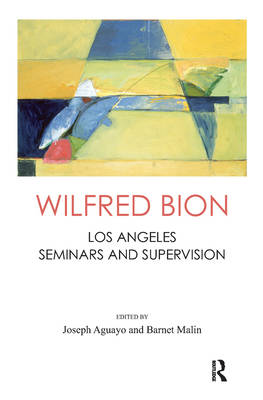
- Afhalen na 1 uur in een winkel met voorraad
- Gratis thuislevering in België vanaf € 30
- Ruim aanbod met 7 miljoen producten
- Afhalen na 1 uur in een winkel met voorraad
- Gratis thuislevering in België vanaf € 30
- Ruim aanbod met 7 miljoen producten
Zoeken
Wilfred Bion
Los Angeles Seminars and Supervision
Wilfred R Bion, Joseph Aguayo, Barnet Malin
Hardcover | Engels
€ 244,45
+ 488 punten
Uitvoering
Omschrijving
Wilfred Bion's unpublished lectures at the Los Angeles Psychoanalytic Society and Institute in April in 1967 represent a unique opportunity for students either new to or continuing in the study of the author's unique psychoanalytic vertex. Here one can both read - and hear - the author's clear exposition of his clinical and theoretical thinking to an audience of primarily Freudian trained American analysts, most of whom were new to his ideas. The first lecture sets out the author's ideas on 'memory and desire' in a paper that set the benchmark in the origins of contemporary Kleinian clinical technique. The author discusses the various factors that facilitate optimal listening receptivity in the analyst, for example how one differentiates the 'K' link vis-a-vis 'transformations in O.' In the second lecture, the author defined projective identification, container/contained and 'beta elements'- and how these ideas serve as an orienting template for the analyst's understanding of 'proto-mental' states of mind, either in psychotic, borderline or neurotic patients. He clarifies these ideas while engaging with the queries of renowned American analysts, such as Ralph Greenson.
Specificaties
Betrokkenen
- Auteur(s):
- Uitgeverij:
Inhoud
- Aantal bladzijden:
- 176
- Taal:
- Engels
Eigenschappen
- Productcode (EAN):
- 9780367101930
- Verschijningsdatum:
- 5/07/2019
- Uitvoering:
- Hardcover
- Formaat:
- Genaaid
- Afmetingen:
- 157 mm x 231 mm
- Gewicht:
- 385 g

Alleen bij Standaard Boekhandel
+ 488 punten op je klantenkaart van Standaard Boekhandel
Beoordelingen
We publiceren alleen reviews die voldoen aan de voorwaarden voor reviews. Bekijk onze voorwaarden voor reviews.











